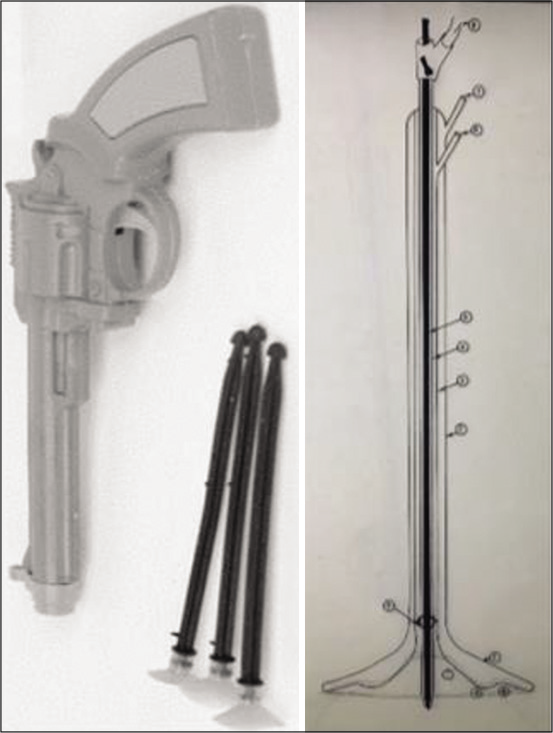- Department of Neurosurgery, Neurosurgery Teaching Hospital, Baghdad, Iraq,
- Department of Neurosurgery, Baghdad Medical City, College of Medicine, University of Baghdad, Baghdad, Iraq,
- Department of Neurosurgery, University Hospital of Wales, Cardiff, Wales, United Kingdom,
- Department of Neurosurgery, Al-Nahrain College of Medicine, Baghdad, Iraq.
Correspondence Address:
Zahraa F. Al-Sharshahi
Department of Neurosurgery, Neurosurgery Teaching Hospital, Baghdad, Iraq,
DOI:10.25259/SNI_162_2021
Copyright: © 2021 Surgical Neurology International This is an open-access article distributed under the terms of the Creative Commons Attribution-Non Commercial-Share Alike 4.0 License, which allows others to remix, tweak, and build upon the work non-commercially, as long as the author is credited and the new creations are licensed under the identical terms.How to cite this article: Al-Sharshahi ZF1, Alhemiary H2, Albaqer HA3, Hamandi YM4, Al-Awadi OM1, Hoz SS1. Following the footprints of pioneers on neurosurgery in Iraq: Abdul Hadi Al-Khalili. Surg Neurol Int 17-Mar-2021;12:110
How to cite this URL: Al-Sharshahi ZF1, Alhemiary H2, Albaqer HA3, Hamandi YM4, Al-Awadi OM1, Hoz SS1. Following the footprints of pioneers on neurosurgery in Iraq: Abdul Hadi Al-Khalili. Surg Neurol Int 17-Mar-2021;12:110. Available from: https://surgicalneurologyint.com/surgicalint-articles/following-the-footprints-of-pioneers-on-neurosurgery-in-iraq-abdul-hadi-al-khalili/
THE ENCYCLOPEDIC APPROACH TO NEUROSURGERY
Prof. Al-Khalili took the extra mile in neurosurgery; he had a vision of enriching the field not only by linking it to other surgical and medical specialties, but also to an impressive list of other branches, including medical engineering, electrical engineering, marketing, economics, computer science, community science, nursing, mathematics, veterinary medicine, dentistry, translation, and library management. His participation in these areas involved supervising Ph.D. students, delivering presentations, and supporting collaborative research projects.
An example of the application of these ventures in neurosurgery is the invention of the “Baghdadi Cerebral Hydatid Cyst Evacuation Instrument,” [
This device was a revolutionary invention that provided a creative technical option to the surgical treatment of cerebral hydatidosis; an endemic disease that, at the time, eroded the population to the point that it was known colloquially as “The Cancer of Iraq.”[
LIGHTING THE DARK CORNERS: THE ORBITAL SURGERY CENTER
Prof. Al-Khalili, a strong advocate for the speciality, has cultivated his previous training in ophthalmology to advance neurosurgery in the region. Not only did he manage to merge his skills and expertise in the treatment of orbital lesions but he also sat up the nation’s first advanced Orbital Surgery Center in 2002, located in Baghdad. The center has grown over the years and continues to be the primary referral center for cases of orbital tumors. The World Health Organization has recognized the unit as a collaboration center and ranked it among the best in the Middle East. In 2003, the center was approved for accreditation by the American Academy of Ophthalmology. This innovative approach to incorporating neurosurgery into other specialties could be replicated to revive other less advantaged areas in neurosurgery.
IMPORTING INTERNATIONAL STANDARDS
Prof. Al-Kahlili has revolutionized the standards of neurosurgical care in many respects. His outstanding leadership and interpersonal skills enabled him to challenge conventional societal norms and to transform the existing third-world level hospital management systems to those that match international standards. For examples, he was the first to introduce computerized patient data systems, disease codes, and procedure-specific charts while also valuing the need to incorporate these into a long-standing culture of poor-documentation. He was also a strong advocate for patient-centered care and the first to use and analyze patient feedback through the use of “How did we do forms,” a culturally unfamiliar practice at the time.
PRACTICING THROUGH THREE CONSECUTIVE WARS
Prof. Al-Khalili practiced neurosurgery in Iraq between 1976 and 2004, witnessing the Iran-Iraq war in 1980, the Gulf War in 1990 and, the “2003” war, when he served at the frontlines. These were the times that tested the limits of the health-care system in the country and demonstrated the robust nature of the system he established. He also shone at this time with his resourcefulness and ingenuity, which helped him to circumvent existing obstacles to push boundaries in the number of publications, quality of surgeries, and excellence in education and training. After 2004, Prof. A-khalili was appointed as the Iraqi cultural attaché in the US and continued his pioneering efforts in re-building the healthcare system and advocating for neurosurgery in the country.[
The footprints of Prof. Abdul Hadi Al-Khalili effectively demonstrate how one man’s vision has re-shaped the history of neurosurgery in a war-ridden country. This journey is, therefore, a lesson to be taught, a story to be told, and an experiment to be replicated.
Declaration of patient consent
Patient’s consent not required as patients identity is not disclosed or compromised.
Financial support and sponsorship
Nil.
Conflicts of interest
There are no conflicts of interest.
References
1. Al Zain TJ, Al-Witry SH, Khalili HM, Aboud SH, Al Zain FT. Multiple intracranial hydatidosis. Acta Neurochir (Wien). 2002. 144: 1179-85
2. Hoz SS, Al-Sharshahi ZF, Al-Juboori Z, Albanaa SA, AlAwadi OM. The history and current status of neurosurgery in Iraq. World Neurosurg. 2020. 140: 353-6
3. Psychiatric News. Available from: https://www.psychnews.psychiatryonline.org [Last accessed on 2021 Jan 09].






